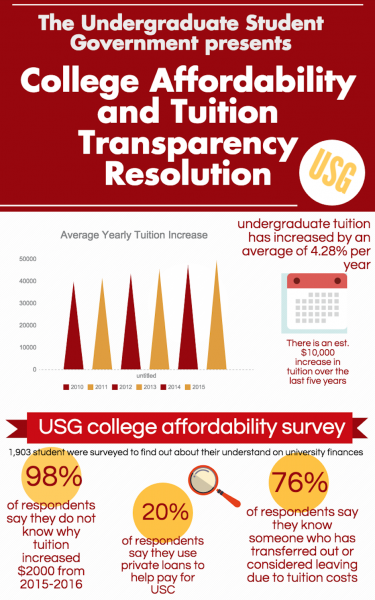USG Passes Tuition Freeze Resolution
The USC Undergraduate Student Government Senate agreed to pass the “College Affordability and Tuition Transparency Resolution” in a meeting held Tuesday. The resolution proposed a tuition freeze to stop the raise of tuition, and to make sure students' voices were being heard about the matter.
To view the resolution plan click here.
“The resolution asks to have a tuition freeze until the administration has a way to combat this affordability issue by forming a strong strategic plan,” said Alec White, the USG senator who sponsored the resolution.
READ RELATED STORIES: USG Introduces College Affordability And Transparency Resolution
With tuition rising faster than inflation by an average 4.5% per year according to the USG, students are curious about the reasons for this incline.
“I read on a Wikipedia page that we are a non-profit university while being private, but I still cannot find that on the school website” says Zihan Wang, a USC economics student. “We are not even sure if our increased tuition fees going to the universitiy or not.”
Wang said he has trouble studying at the Leavey Library because of how crowded it is. “I don’t think these tuition fees are being allocated properly.”

Wang is not the only student who feels this way. A month previously, USG sent out a survey regarding college affordability and the transparency of students' tuition dollars at USC. According to the results of 1,903 respondents, 98 percent of the respondents said that they do not know where their tuition dollars go.
“We found a report that says where the money is going but it is really vague,” USG Senator White said. “For example, 25 percent goes to other salaries, but we do not know what those other salaries are for.”
The resolution says that if the administration approves of the tuition freeze, this will allow time to address the issue of college affordability, develop a webpage with a detailed report of were tuition funds go yearly, and create an student advisory committee to watch over the administration.
Some of the students at USC do not find these actions necessary. USC gerontology PhD student Deborah Hoe said that other schools have this problem, and that freezing tuition will not work.
“We tend to think of things as short term, and do not understand that the tuition fees are a long-term investment for our graduate students and our active alumni group,” said Hoe. “This is also one of the top research universities in the world.” Currently she uses the resources provided by the school to study ageism in the workplace and the poverty of older adults.
One of the senators who voted in favor of the resolution, Eric Dubbery, did not vote yes so that something could be done about the increase in tuition, but wanted to address the transparency problem of the tuition increase. “The money may not necessarily be going in bad places, but if all the stakeholders involved knew where the money was going then together we can address how to cut costs down and better ways to deal with it with scholarships and aid,” he said.
In the next two weeks, the USG will present the resolution to the administration in hopes of addressing these problems.
WATCH RELATED CONTENT: USG Introduces College Affordability And Transparency Resolution










